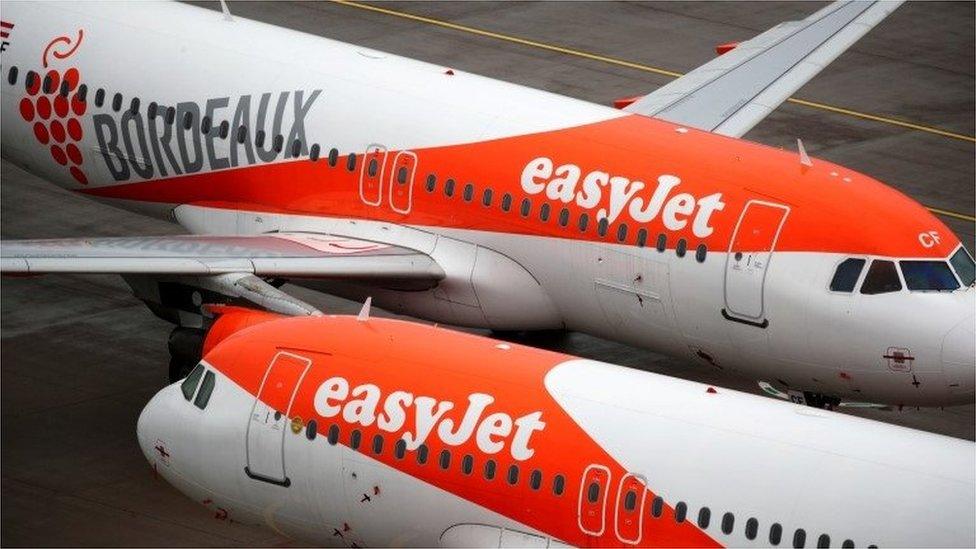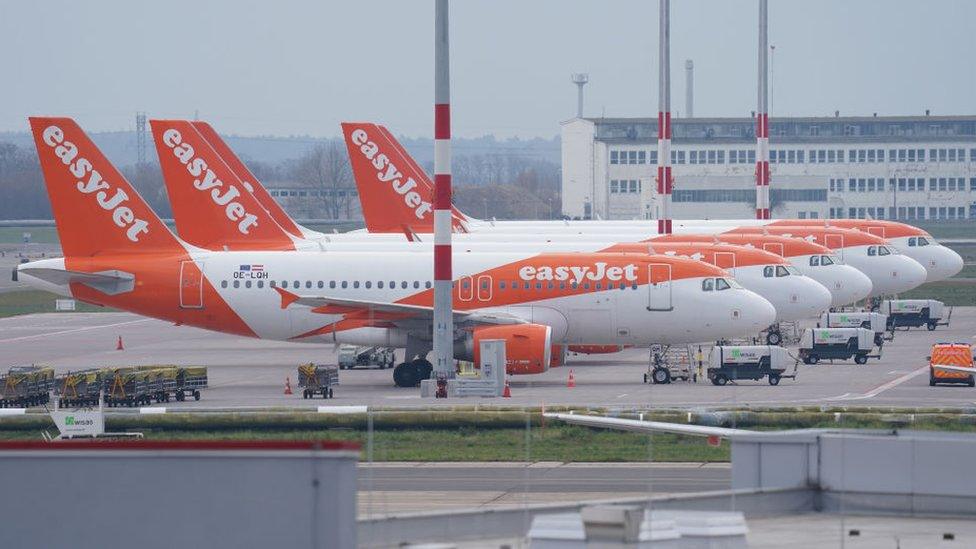EasyJet says Omicron has weakened bookings
- Published
- comments

EasyJet has seen "some weakening" in bookings amid concern about the new Covid variant, the airline's boss says.
But Johan Lundgren told the BBC it was too early to assess what the full impact might be, saying: "We need to see how things settle down."
He also said bookings for next summer were largely unaffected, with strong pent-up demand likely to see a return close to pre-pandemic 2019 levels.
The Omicron variant has led to the imposition of new travel rules.
The new strain, which emerged in South Africa, had an immediate impact on the services of long-haul airlines such as British Airways and Virgin Atlantic.
But as the virus spreads there are fears short-haul European airlines such as EasyJet could also be hit.
Mr Lundgren told the BBC's Today programme his airline had not so far seen the same impact on bookings as when previous restrictions were introduced.
He said the customer booking changes had mostly been people moving imminent trips to early next year.
Mr Lundgren said he was supportive of the swift re-introduction of the "red list" crackdown on travel, but "there's a question mark around the blanket PCR testing" for infection.
"It's not obvious to me that if you're travelling in from a country… that doesn't have any reported cases of the Omicron, that you should assume that you should have to take an expensive PCR test," he said.
On Monday, EasyJet said it would extend its fee-free rebooking policy until March 2022.
Mr Lundgren said the airline's restructuring during the collapse in air travel at the height of the pandemic meant it was well placed to handle any further disruption.
The airline, which has cut costs and prioritised the strongest routes, said it had seen an encouraging start to the winter season.
In a financial update on Tuesday, EasyJet reported that revenue booked for the second half of its financial year was ahead of 2019 levels. The airline is increasing its fleet plan by 25 aircraft, with slots added at Gatwick, Porto, Lisbon and Milan's Linate.
However, the carrier still reported a loss before tax of £1.14bn for the year to end-September, up from a £835m loss the year before.
'Patchy months'
Despite the hefty loss, which covered some of the worst periods of the pandemic, the figure was still better than expected, according to Sophie Lund-Yates of share broker Hargreaves Lansdown.
She said EasyJet's restructuring, low-cost business model, and strong route network with bases at popular destinations, was cause for optimism about a bounce-back.
However, she added: "Airlines can't seem to catch a break. News of new Covid variants, and the potential for further travel restrictions, makes it incredibly difficult to predict trading patterns from here.
"There is no getting away from the fact [EasyJet has] further to climb and the coming months will be patchy at best."
Meanwhile, other airlines voiced caution about the possible impact of Omicron on trading.
The president of Dubai-based long haul carrier Emirates, Tim Clark, said a major hit to peak winter travel would cause serious problems for global aviation.
He told Reuters news agency: "December is a very important month for the air travel business. If that is lost, or the winter is lost to a lot of carriers, there will be significant traumas in the business, certainly the aviation business and the periphery."
And the Scandinavian operator SAS said in a financial statement on Tuesday "we remain cautious due to prevailing uncertainties".
- Published11 February 2022

- Published29 November 2021

- Published29 November 2021

- Published20 October 2021
